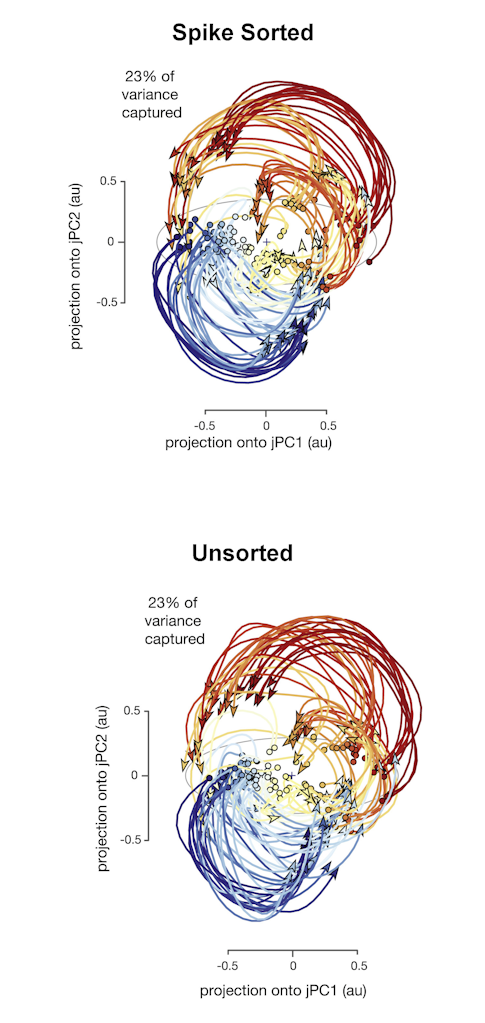How Important Is Spike Sorting?
Many experiments in systems neuroscience follow the same general steps: Record neural activity using a multielectrode array, sort the activity on each electrode as coming from different individual neurons, and use the activity of the neural population to understand behavior. New research published in Neuron in June asked just how important the second step — known as “spike sorting” — really is. (For more on spike sorting, see “Spike Sorting Becomes Fully Automated.”)

Spike sorting takes time, and as smaller and more sophisticated electronics increase the number of electrodes that can be packed into an array, the burden of this pre-processing step will only increase. Eric Trautmann and collaborators from Stanford University, including Simons Collaboration on the Global Brain investigators Surya Ganguli and Krishna Shenoy, ran simulations to demonstrate that a popular measure of neural activity shows the same results whether or not spike sorting is performed.
Neuroscientists record from hundreds of neurons during a task, but the computations these neurons carry out can likely be described in far fewer terms. Researchers commonly use a technique called dimensionality reduction to discover a simpler description of the behavior of a population of neurons. Specifically, this technique starts with a high-dimensional description of neural activity that gets mathematically reduced to a lower-dimensional one.
Each electrode in a multielectrode array can contain the activity of several different neurons as well as a mix of background noise. With spike sorting, researchers first categorize spikes as coming from individual neurons (often based on the shape of the voltage trace) and then plot activities in a high-dimensional space where each neuron is represented by an axis. In the new work, researchers instead used the activity on individual electrodes for each axis: Any time the value recorded on an electrode crossed a certain threshold, it was treated as a spike. Making this switch could plausibly have a major effect on the outcome of the analysis. The researchers found, however, that the low-dimensional trajectories were similar regardless of whether the incoming data was spike-sorted, as long as the activity of the neurons on a single electrode weren’t anti-correlated.
To further verify that sorting isn’t necessary for understanding neural populations, Trautmann and collaborators took three different studies of the motor system that used spike-sorted data and replicated their findings using unsorted data.
Previous research hinted that spike sorting might not be necessary for population-level studies — for example, it only minimally impacts the ability to predict an animal’s arm position from neural activity in the motor cortex. Another study showed that a rat’s location in space can be accurately read out using unsorted activity recorded from the hippocampus.
It’s not just coincidence that sorted and unsorted results are similar; it’s a finding that can be predicted and understood using mathematics. The authors use a technique called ‘random projection theory’ to show how randomly combining neurons on an electrode will do little to distort the underlying low-dimensional structure of the activity. They also calculated precisely how this distortion depends on the parameters of the experiment. If researchers want to bypass spike sorting in their experiments, they should use short trial lengths and a small number of behavioral conditions, and record from many independent electrodes.
The findings are only applicable to studies that are trying to analyze neural population activity as a whole, an increasingly popular approach. Experiments designed to analyze the responses of individual neurons and the statistics of individual neural responses still require spike sorting.


